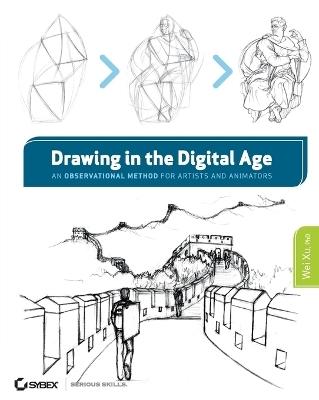
Drawing in the Digital Age
Sybex Inc.,U.S. (Verlag)
978-1-118-17650-4 (ISBN)
A solid foundation for improving your drawing skills Teaching a new observational method based on math and computer graphics principles, this book offers an innovative approach that shows you how to use both sides of your brain to make drawing easier and more accurate. Author Wei Xu, PhD, walks you through his method, which consists of scientific theories and principles to deliver real-world techniques that will improve your drawing skills. Xu's pioneering approach offers a solid foundation for both traditional and CG artists.
Encourages you to use both sides of your brain for drawing with the highest efficiency possible
Introduces an innovative method invented by the author for improving your drawing skills
If you are eager to learn how to draw, then this book is a must read.
Wei Xu, PhD, teaches game programming and production, 3D math, and life drawing at the Art Institute of California—San Diego. He also teaches iOS game programming and drawing classes at University of California San Diego Extension. He is cofounder of Geomy Entertainment, LLC, a game-consulting firm. Xu was previously a lead engineer at Sony Computer Entertainment America for game technology R&D and a senior CG software engineer at Schlumberger Austin Technology Center.
Introduction xiii
Chapter 1 Understanding the Relationship between Math and Art 1
Understanding How Math and Art Differ 2
Understanding How Math and Art Are Similar 4
Using Math to Create Digital Art 13
Using Math in Traditional Drawing 15
Using Math to Help You Draw 18
Examining Existing Drawing Methods 22
Stop Separating Math from Art 28
Chapter 2 Extracting Graphical Structures— A Scientific Point of View 31
Introducing CG Concepts and Principles 32
Unifying 2D and 3D Cases 40
Understanding the Properties of Basic Shapes 43
Understanding Graphical Structures 47
Extracting GSs with Triangulation 54
Chapter 3 Drawing with the ABC Method 57
Meeting the Criteria for a New Drawing Method 58
Introducing the ABC Method 61
Chapter 4 Drawing Simple Objects 79
Preparing to Draw 80
Extracting Basic Information 80
Demonstrations of 3D Objects 85
Demonstrations of 2D Images 92
Exercises 97
Chapter 5 Drawing Complicated Objects 99
Breaking Down Complexity 100
Demonstrations 108
Exercises 120
Chapter 6 Drawing Complicated Scenes 121
Introducing Techniques for Merging Objects 122
Demonstrations 129
Exercises 138
Chapter 7 Using Advanced Techniques 141
Working with Curved Triangles and Polygons 142
Drawing a Group of Ovals 146
Using Shadow Maps 149
Using Rhythms for Partitioning 151
Exploring Trade-Offs between Accuracy and Speed 152
Demonstrations 153
Summary 161
Exercises 161
Chapter 8 Using Special Techniques for Drawing Human Bodies 163
General Tips 164
Tips for Drawing Faces 169
Tips for Quick Life Sketches 174
Demonstrations 180
Summary 186
Exercises 187
Post-Test: Drawing Van Gogh 188
Index 189
| Erscheint lt. Verlag | 6.3.2012 |
|---|---|
| Verlagsort | New York |
| Sprache | englisch |
| Maße | 185 x 234 mm |
| Gewicht | 340 g |
| Themenwelt | Kunst / Musik / Theater ► Malerei / Plastik |
| Mathematik / Informatik ► Informatik ► Grafik / Design | |
| Informatik ► Office Programme ► Outlook | |
| Sozialwissenschaften ► Pädagogik | |
| Technik ► Architektur | |
| ISBN-10 | 1-118-17650-2 / 1118176502 |
| ISBN-13 | 978-1-118-17650-4 / 9781118176504 |
| Zustand | Neuware |
| Informationen gemäß Produktsicherheitsverordnung (GPSR) | |
| Haben Sie eine Frage zum Produkt? |
aus dem Bereich


